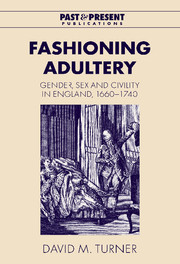Book contents
- Frontmatter
- Contents
- Acknowledgements
- Note on the text
- List of abbreviations
- Introduction
- 1 Language, sex and civility
- 2 Marital advice and moral prescription
- 3 Cultures of cuckoldry
- 4 Sex, death and betrayal: adultery and murder
- 5 Sex, proof and suspicion: adultery in the church courts
- 6 Criminal conversation
- Conclusion
- Bibliography
- Index
- Past and Present Publications
1 - Language, sex and civility
Published online by Cambridge University Press: 01 July 2009
- Frontmatter
- Contents
- Acknowledgements
- Note on the text
- List of abbreviations
- Introduction
- 1 Language, sex and civility
- 2 Marital advice and moral prescription
- 3 Cultures of cuckoldry
- 4 Sex, death and betrayal: adultery and murder
- 5 Sex, proof and suspicion: adultery in the church courts
- 6 Criminal conversation
- Conclusion
- Bibliography
- Index
- Past and Present Publications
Summary
In 1675 an anonymous author set forth a series of proposals explaining ‘why a Law should pass in England to punish Adultery with Death’. Adultery was described as ‘a complication of all the wickedness in lust, breach of faith and robbery’, breaking the matrimonial vows and robbing a man of his wife's affections. Familiar precedents in Judaic law and the perceived ineffectiveness of judicial separation at the church courts as a remedy for wronged husbands were cited to show the apparent leniency of current laws against vice. Yet it was the moral turpitude of the present times that ultimately justified the reintroduction of this extreme solution. ‘The present law being so defective’, it was argued, ‘the crime grows upon it’ and had become ‘common’. A key feature of the author's vision of moral depravity was linguistic corruption. ‘This Age’, he complained, ‘gives the soft and gentle French Names of Gallantry and Divertisement’ in ‘Apology’ for adultery.
Language has always been a site of contest in the construction of the social and moral meanings of sexual transgression. The terminology by which infidelity is described acts as a point of identification with a broader system of values.
- Type
- Chapter
- Information
- Fashioning AdulteryGender, Sex and Civility in England, 1660–1740, pp. 23 - 50Publisher: Cambridge University PressPrint publication year: 2002

